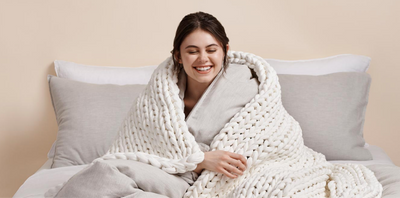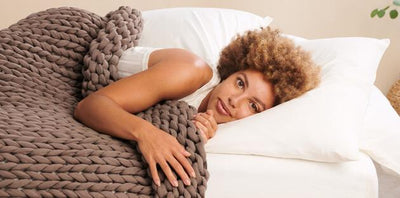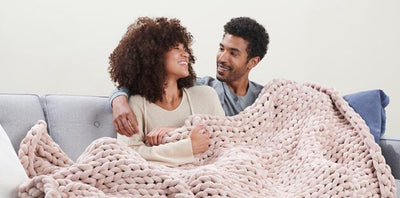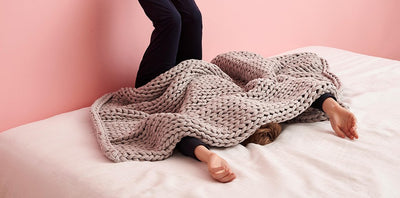Why We Sleep Lighter As We Age, & How Weighted Blankets Can Help
There are some things you can do to better support your sleep as you age, from morning sunshine to making a weighted blanket your new best friend.

Bearassentials
It’s not all in your head - adults do get less and less sleep as we age, mainly due to reduced melatonin and growth hormone production.
Older adults spend less time in slow-wave deep sleep, which is made worse by waking up 3-5 times per night for bathroom breaks or various health conditions.
Support your sleep (and melatonin) while you age by getting morning sunlight, adequate exercise, using a weighted blanket, and limiting naps to 20 minutes.
Did you know?
Older adults’ sleeping patterns may be related to evolution. When multiple generations of our ancestors all slept under the same roof, the grandparents tended to get the early morning shift of keeping watch or caring for the babies in the house.
If it seems like you’ve been sleeping less and less as the years go by, you’re not wrong. While those in their teens and early twenties seem to be easily able to snooze until noon, it’s not uncommon for older people to start waking up closer to dawn, with plenty of nighttime wake-ups in between.
While it can be an annoyance to not get as much sleep as you used to, there are biological reasons for these changes - mainly differences in our sleep cycles and hormone production. However, there are some things you can do to better support your sleep as you age, from morning sunshine to making a weighted blanket your new best friend.
Sleep Cycles Through The Ages
The main reason that we sleep lighter as we age is due to changes in our sleep cycles. For a refresher, we have five sleep stages that we cycle through every night; each stage varies in length but each cycle totals approximately 90 minutes.
Just one of the five stages is REM sleep, which stands for rapid eye movement; this is the main stage we dream in. The other four stages are non-REM sleep, and they range from light sleep to deep sleep. In stages 3 and 4 of non-REM sleep, also known as slow-wave sleep, you’re in the deepest of the deep sleeps. This is the most restorative sleep, when your brain shuts off and you’re not dreaming, and also the stage in which you’ll have the hardest time waking up.
However, it has been shown that the amount of time we spend per night in this slow-wave, deep non-REM sleep reduces as we get older. Even though adults of all ages need the same amount of sleep per night (about 7 to 9 hours), older adults typically average about 6.5 to 7 hours of sleep. While it’s been shown that infants can cycle through all the stages in as little as 50 minutes, adults’ sleep cycles average 90 minutes but can go up to 120 minutes.
As we age, it’s also common to wake up between 3 to 5 times each night, which can disrupt and shorten the sleep cycles. Each time we wake up, the 90-120 minute sleep cycle has to start over again, meaning you may not get many full sleep cycles throughout the night. Let’s dive into why we start waking up so often as the years go by.
Light Sleep: What Are The Causes?
The secretion of melatonin, our primary sleep hormone, decreases as we get older. Lower melatonin may mean that older adults get sleepier earlier in the evening, as well as start waking up earlier. This is called Advanced Sleep Phase Syndrome, meaning that the sleep patterns of older adults tend to be shifted earlier. However, some older adults may not get sleepy in the evening at all, yet still wake up early, thus shortening their overall sleep time.
We also secrete less growth hormone (GH) as we age, which makes sense, as we’re not quite growing anymore. GH production peaks in childhood and is correlated with deep sleep; this is one of the main reasons why children grow so fast and can sleep so soundly. As older adults produce less GH, that also means they spend less time in the deep sleep stages.
Some light sleepers may wake up due to medical conditions or medications they are taking. Often, older adults need frequent bathroom breaks, both during the day and throughout the night, which can lead to disruptions in the sleep cycle. Other conditions that can cause light sleeping, like Restless Leg Syndrome or sleep apnea, are more common in older adults. For women, symptoms associated with going through menopause can also affect sleep, like night sweating. (Helpful hint: try a cooling Tree Napper for sweaty sleep!)

How To Support Sleep As You Age
Make a Weighted Blanket Your BFF
Using a weighted blanket while you sleep can help with some of the sleep disruptions associated with age. The extra weight activates Deep Touch Pressure, which leads to an increase in the melatonin production that is typically reduced in older adults. The pressure can also help relax the body in conditions like Restless Leg Syndrome.
Get Some Sunshine
Another great way to boost melatonin production (and happiness!) is by getting some sunlight, especially in the morning or early afternoon hours. Getting natural sunshine also helps to regulate your circadian rhythm, which we know can get shifted in older adults. It’s best to get some direct sunshine into your eyes, so take off the sunglasses for a portion of your walk! Speaking of walking…
Stay Active
Adults tend to get more sedentary as they age, but physical activity can be a huge benefit to overall health, including sleep health. Light exercise can also help to regulate your circadian rhythm, which will lead to sleep improvements at night. Not only does exercise benefit sleep, but it can help to prevent many age-related chronic diseases, like high blood pressure, heart disease, and osteoporosis. Bonus points if you walk in the morning sunlight!
Limit Naps
Even though you may be tired during the day, napping too much can negatively affect your ability to fall asleep later that night, especially if you rely on daily naps. If you absolutely need some extra snoozes, try a 20-minute power nap, which will refresh you without impacting your sleep that night. Pro tip: Using a weighted blanket for the power nap will help you fall asleep even quicker!






